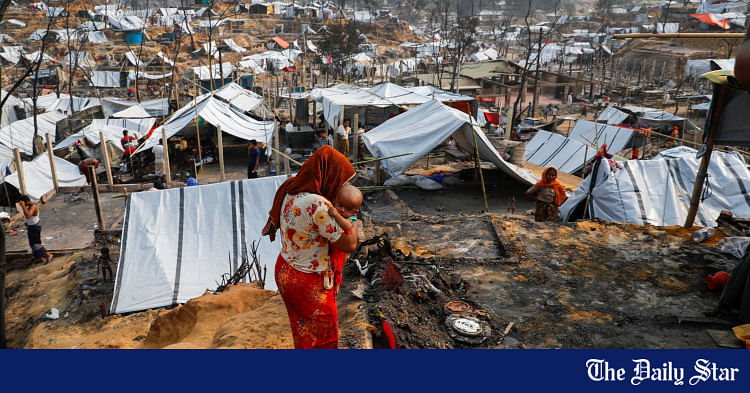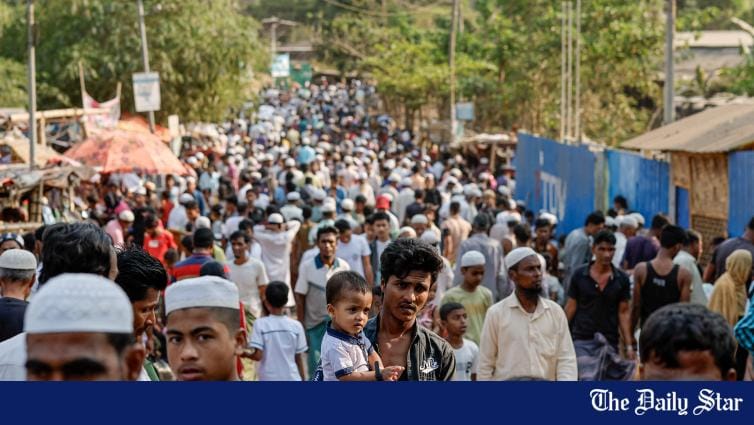Saif
Senior Member
- Joined
- Jan 24, 2024
- Messages
- 16,117
- Likes
- 8,060
- Nation

- Axis Group


Myanmar junta chief confirms year-end election plan
Myanmar’s junta chief said the country plans to hold elections in December and January, state media reported Thursday, pressing ahead with polls denounced as a sham by international monitors...
 www.newagebd.net
www.newagebd.net
Myanmar junta chief confirms year-end election plan
Agence France-Presse . Yangon 27 June, 2025, 00:17
Myanmar’s junta chief said the country plans to hold elections in December and January, state media reported Thursday, pressing ahead with polls denounced as a sham by international monitors.
The military deposed Myanmar’s civilian government in a 2021 coup which sparked a many-sided civil war, but has promoted its election plans as a pathway to peace.
With members of the former government locked away, opposition groups set to boycott the vote and huge tracts of the country controlled by anti-junta rebels, observers say a fair poll is impossible.
State newspaper The Global New Light of Myanmar said junta chief Min Aung Hlaing, speaking at a conference in the capital Naypyidaw on Wednesday, ‘pledged that the election will be held in December this year and January next year’.
It is not clear whether the junta plans to hold the election in phases — a potential sign it would struggle to guarantee security on a single nationwide polling day — or whether the timetable includes a campaign period.
On Wednesday, the United Nations’ special rapporteur on the rights situation in Myanmar, Tom Andrews, said the junta is ‘trying to create this mirage of an election exercise that will create a legitimate civilian government’.
‘You cannot have an election when you imprison and torture and execute your opponents, when it is illegal to report the truth as a journalist, when it’s illegal to speak out and criticise the junta,’ he told reporters in Geneva.
Junta forces have suffered stinging territorial losses to pro-democracy guerrillas and powerful ethnic armed organisations in recent months.
Military backing from China and Russia is letting it stave off defeat, analysts say, but huge areas of the country are set to be beyond the reach of any junta-organised democratic exercise.
A junta census held last year to prepare for the poll admitted it could not collect data from an estimated 19 million of the country’s 51 million people, in part because of ‘significant security constraints’.
‘We are currently making the necessary preparations to hold the elections as widely and extensively as possible,’ Min Aung Hlaing said, according to a transcript of his conference speech in The Global New Light of Myanmar.
‘Most importantly, the elections must be free and fair,’ he said.
Agence France-Presse . Yangon 27 June, 2025, 00:17
Myanmar’s junta chief said the country plans to hold elections in December and January, state media reported Thursday, pressing ahead with polls denounced as a sham by international monitors.
The military deposed Myanmar’s civilian government in a 2021 coup which sparked a many-sided civil war, but has promoted its election plans as a pathway to peace.
With members of the former government locked away, opposition groups set to boycott the vote and huge tracts of the country controlled by anti-junta rebels, observers say a fair poll is impossible.
State newspaper The Global New Light of Myanmar said junta chief Min Aung Hlaing, speaking at a conference in the capital Naypyidaw on Wednesday, ‘pledged that the election will be held in December this year and January next year’.
It is not clear whether the junta plans to hold the election in phases — a potential sign it would struggle to guarantee security on a single nationwide polling day — or whether the timetable includes a campaign period.
On Wednesday, the United Nations’ special rapporteur on the rights situation in Myanmar, Tom Andrews, said the junta is ‘trying to create this mirage of an election exercise that will create a legitimate civilian government’.
‘You cannot have an election when you imprison and torture and execute your opponents, when it is illegal to report the truth as a journalist, when it’s illegal to speak out and criticise the junta,’ he told reporters in Geneva.
Junta forces have suffered stinging territorial losses to pro-democracy guerrillas and powerful ethnic armed organisations in recent months.
Military backing from China and Russia is letting it stave off defeat, analysts say, but huge areas of the country are set to be beyond the reach of any junta-organised democratic exercise.
A junta census held last year to prepare for the poll admitted it could not collect data from an estimated 19 million of the country’s 51 million people, in part because of ‘significant security constraints’.
‘We are currently making the necessary preparations to hold the elections as widely and extensively as possible,’ Min Aung Hlaing said, according to a transcript of his conference speech in The Global New Light of Myanmar.
‘Most importantly, the elections must be free and fair,’ he said.









































